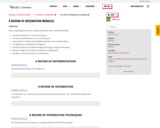
227 Results


After completing this section, students should be able to do the following.Determine when a function is a composition of two or more functions.Calculate indefinite and definite integrals requiring complicated substitutions.Recognize common patterns in substitutions.Evaluate indefinite and definite integrals through a change of variables.

The Calculus II course was developed through the Ohio Department of Higher Education OER Innovation Grant. This work was completed and the course was posted in February 2019. The course is part of the Ohio Transfer Module and is also named TMM006. For more information about credit transfer between Ohio colleges and universities, please visit: www.ohiohighered.org/transfer.Team LeadJim Fowler Ohio State UniversityRita Ralph Columbus State Community CollegeContent ContributorsNela Lakos Ohio State UniversityBart Snapp Ohio State UniversityJames Talamo Ohio State UniversityXiang Yan Edison State Community CollegeLibrarianDaniel Dotson Ohio State University Review TeamThomas Needham Ohio State UniversityCarl Stitz Lakeland Community CollegeSara Rollo North Central State College
- Subject:
- Calculus
- Mathematics
- Material Type:
- Full Course
- Provider:
- Ohio Open Ed Collaborative
- Date Added:
- 05/07/2021


After completing this section, students should be able to do the following.Determine if a series converges absolutely or conditionally.Answer conceptual questions about absolute convergence


After completing this section, students should be able to do the following.Apply the procedure of “Slice, Approximate, Integrate” to derive a formula for volume of solids with known cross-section areasSet up an integral or sum of integrals that gives the volume of a solid whose cross sections are familiar geometric shapes.


After completing this section, students should be able to do the following.Determine if a series converges using the alternating series test.Determine if a series converges absolutely.Determine if a series converges conditionally.Determine if an alternating series diverges.


After completing this section, students should be able to do the following.Understand linear density and its connection to mass.Calculate the mass of an objection with varying density.Understand work and how it is computed.Calculate work when force is varying.Know when to integrate a cross-section to solve a physics problem.Calculate work when distance is varying.


After completing this section, students should be able to do the following.Compute Taylor polynomials.Use Taylor’s theorem to estimate the error of a Taylor polynomial.Determine the maximum error between a function and a given Taylor polynomial.


After completing this section, students should be able to do the following.Apply the procedure of “Slice, Approximate, Integrate” to derive a formula for the area bounded by given curves.Understand the difference between net and total area.Find the area bounded by several curves.Set up an integral or sum of integrals with respect to xx that gives the area bounded by several curves.Set up an integral or sum of integrals with respect to yy that gives the area bounded by several curves.Decide whether to integrate with respect to xx or yy.


After completing this section, students should be able to do the following.Compute derivatives of common functions.Compute antiderivatives of common functions.Understand the relationship between derivatives and antiderivatives.Use algebra to manipulate the integrand.Evaluate indefinite and definite integrals through a change of variables.Evaluate integrals that require complicated substitutions.Recognize common patterns in substitutions.


After completing this section, students should be able to do the following.Use Taylor series to read-off derivatives of a function.Use Taylor series to solve differential equations.Use Taylor series to compute integrals.
